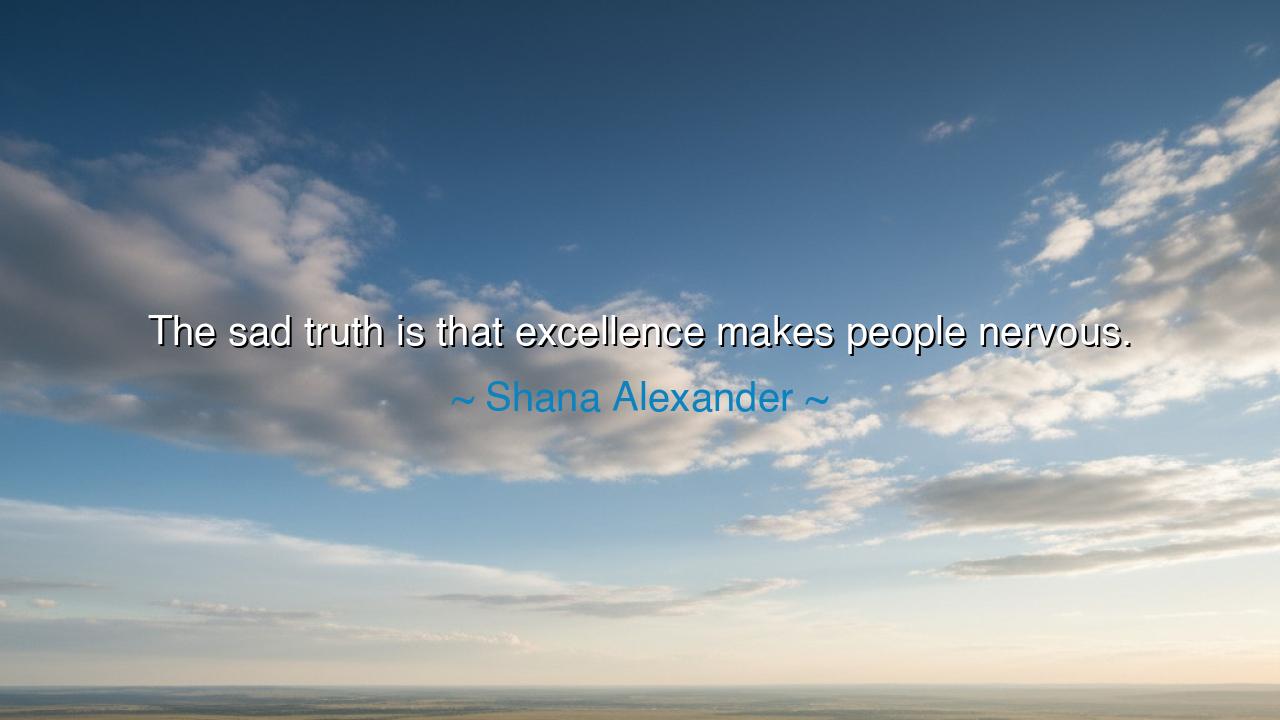
The sad truth is that excellence makes people nervous.






Hear the piercing words of Shana Alexander, who declared with unflinching clarity: “The sad truth is that excellence makes people nervous.” These words shine a light on one of the oldest realities of human nature: that greatness, instead of always being celebrated, often provokes discomfort, envy, and fear. For when one soul rises above the ordinary, it unsettles those who prefer the safety of the familiar, exposing their own limits, and reminding them of the heights they have not climbed.
The heart of this saying rests in the paradox of excellence. It is a light meant to inspire, yet that very light can cast shadows upon those who dwell beside it. To behold a person of extraordinary talent, discipline, or courage is to confront one’s own mediocrity. Rather than see excellence as a beacon, many see it as a threat. And so, instead of honoring greatness, they mock it, resist it, or turn away from it. This is the sad truth Alexander speaks of—the truth that humanity is often more at ease with sameness than with brilliance.
The ancients, too, knew this truth well. Consider the fate of Socrates, the wisest man of Athens, who was condemned to death not because of crime, but because his excellence in questioning disturbed the powerful and unsettled the comfortable. His brilliance made his peers nervous, and rather than learn from him, they silenced him. Likewise, the story of Galileo, whose mastery of the heavens revealed truths too great for the timid hearts of his time, shows us how excellence often provokes fear more than reverence.
History gives us many more such mirrors. Joan of Arc, a peasant girl with divine conviction, led armies with a courage that shamed seasoned generals. Yet her very excellence unnerved the men of her age, and they called her a witch to justify their fear. Or consider Leonardo da Vinci, whose genius stretched across art, science, and invention. His excellence was so unmatched that many dismissed him as strange, eccentric, or even dangerous. In every age, the truly excellent unsettle the ordinary, for they remind the world of untapped possibility.
Yet let us not despair, for there is also nobility in this sad truth. For though excellence provokes nervousness, it also awakens longing. Those who resist today may be inspired tomorrow. Socrates was condemned, yet his words shaped philosophy for millennia. Galileo was silenced, yet the stars themselves proclaimed his truth. Joan of Arc was executed, yet remembered as a saint and a hero. Excellence may unsettle the present, but it shapes the future.
The lesson then is clear: do not fear the nervousness your excellence creates. If your gifts make others uncomfortable, it may be a sign that you are living as you were meant to live. Excellence demands courage, not only in its pursuit but in enduring the resistance it provokes. To shrink from greatness out of fear of others’ unease is to betray the very gift entrusted to you.
Practical wisdom calls to us: cultivate your craft without apology. Walk boldly in your talent, your discipline, your vision. When others grow nervous, let it not weaken your resolve but strengthen your clarity. And when you encounter excellence in another, choose admiration over envy, humility over resentment. For in honoring the greatness of others, you prepare your own heart for greatness as well.
Thus, the words of Shana Alexander stand as both warning and encouragement: “Excellence makes people nervous.” Accept this, and you will no longer be surprised by the world’s unease. Instead, you will walk the path of the great ones before you—unmoved by fear, devoted to your calling, and leaving behind not just nervousness, but a legacy that inspires generations yet to come.






AAdministratorAdministrator
Welcome, honored guests. Please leave a comment, we will respond soon